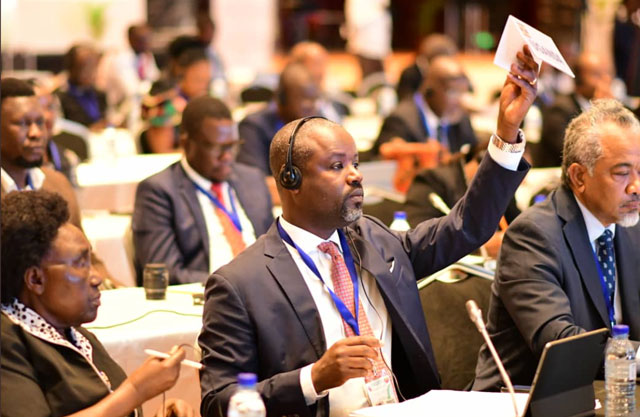
Tayebwa said Uganda is deeply concerned over coercive and persistent calls to the African, Caribbean, and Pacific – ACP States by the EU, and partners to adopt homosexuality.
He explained that diplomatic, trade and aid relationships between the EU and partner states are governed by the Cotonou Agreement meant to promote ‘political issues of mutual concern or of general significance’ and not ‘discrimination of any kind.
Tayebwa says that Uganda demands a broad definition of the issue of human rights because the Post-Cotonou agreement has hidden clauses around human rights, especially those relating to sexuality, the promotion of homosexuality, and abortion. He explains that such practices are un-African in nature.
The 42nd Session of the African, Carribean and Pacific-European Union Joint Parliamentary Assembly has been opened by H.E Filipe Jacinto Nyusi, President of Mozambique here in Maputo today morning. We are engaging on the post Cotonou Agreement which will govern ACP-EU relations. pic.twitter.com/LwpzEhgfH9
— Thomas Tayebwa (@Thomas_Tayebwa) October 31, 2022
Mozambique’s President, Filipe Nyusi opened the summit. The Ugandan delegation comprises Theodore Ssekikubo, the Lwemiyaga County MP, Cecilia Barbara Atim Ogwal, the Dokolo District Woman Representative, Maurice Kibalya from Bugabula South, Elijah Okupa from Kasilo County, Dr. Samuel Opio Acuti from Kole North and the Amuru District Woman representative, Lucy Akello.
Other pertinent issues being discussed at the summit include climate change and food security; health and the fight against terrorism, women’s empowerment for political leadership; migration, and sustainable growth.
Dokolo Woman Legislator, Cecilia Ogwal backed Tayebwa’s stance on rejecting homosexuality, saying that Uganda and Africa as a whole are not comfortable with the EU’s conditions on sexual orientation and abortion rights.
The ACP–EU Joint Parliamentary Assembly was created to bring together the elected representatives of the European Union (the Members of the European Parliament) and the elected representatives of the African, Caribbean, and Pacific states (“ACP countries”) that have signed the Cotonou Agreement.
Signed on 23 June 2000 in Cotonou, Benin, the global agreement introduced important changes based on three pillars of development, economic and trade cooperation between developing countries and the EU to reduce and eventually eradicate poverty.
 The Independent Uganda: You get the Truth we Pay the Price
The Independent Uganda: You get the Truth we Pay the Price



